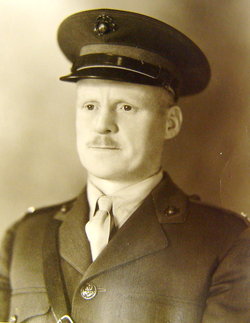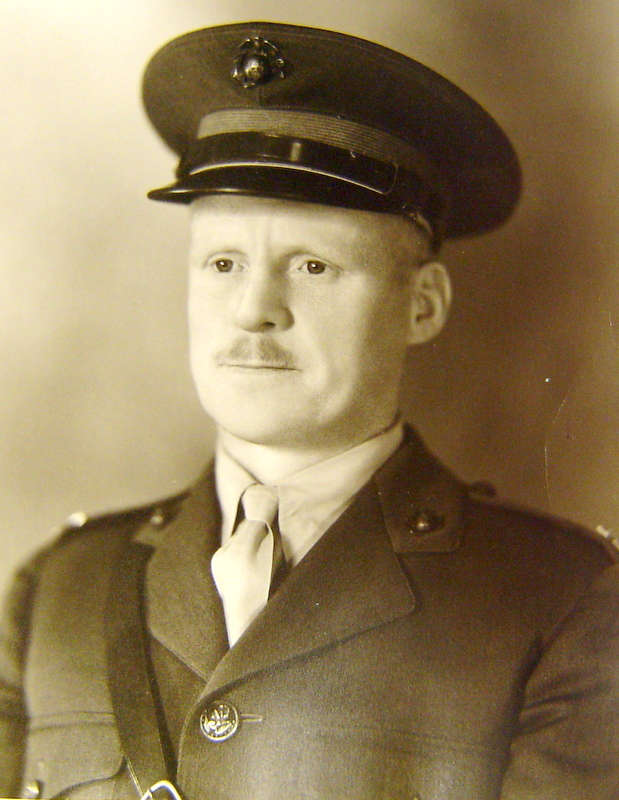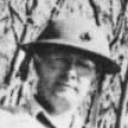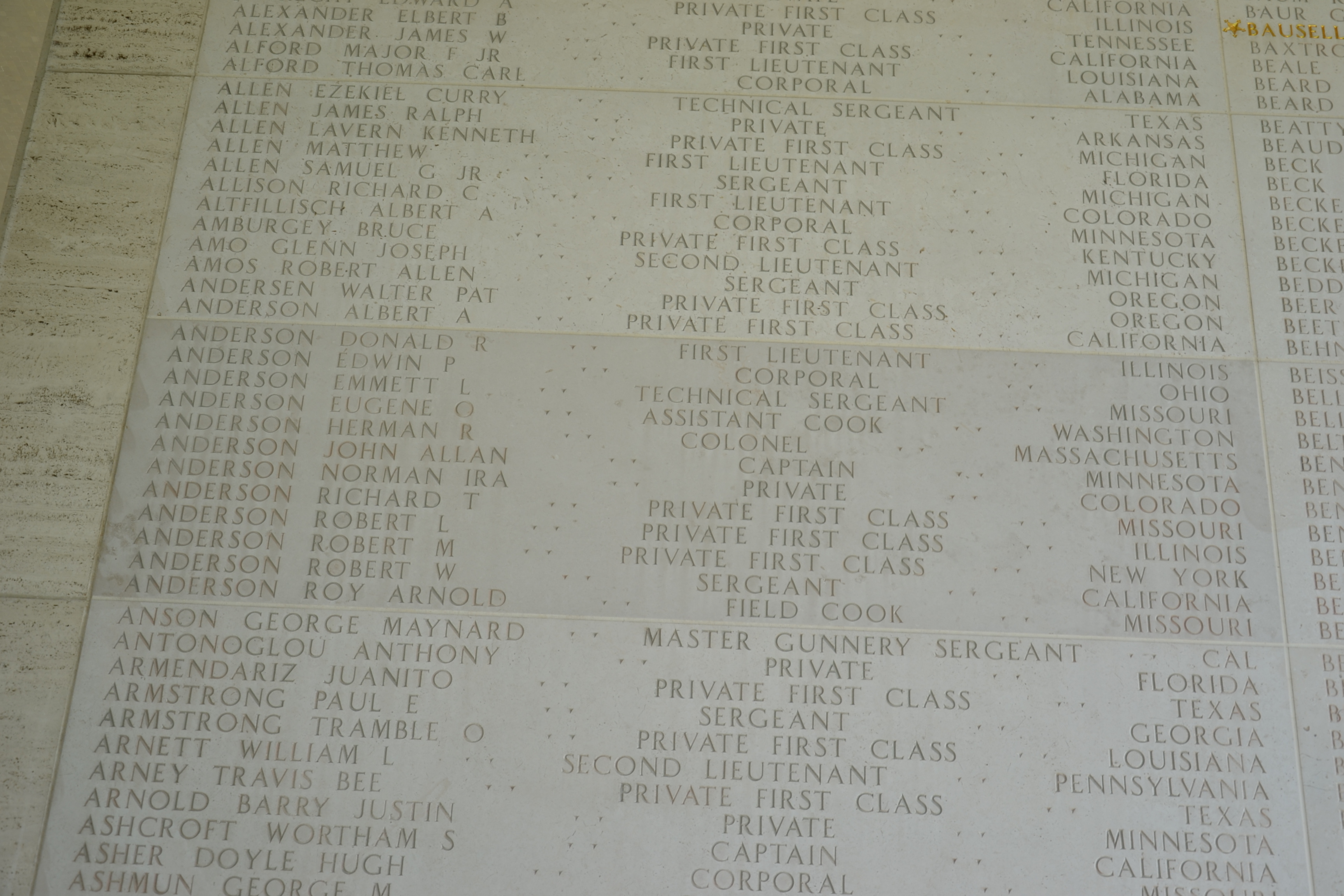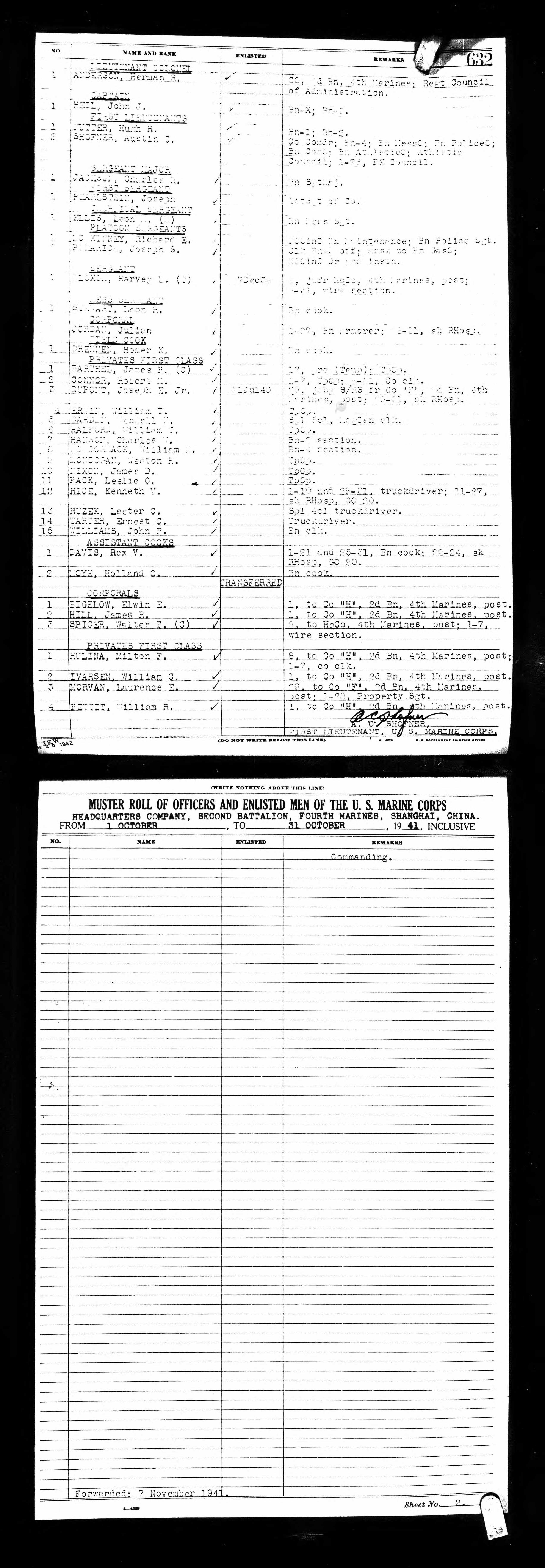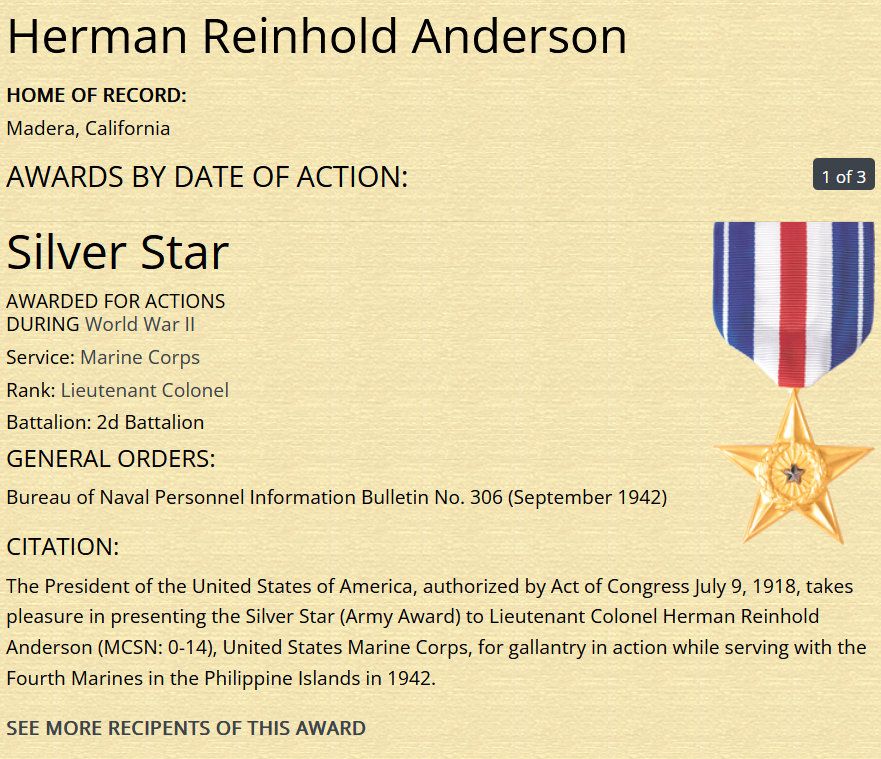Anderson joined the Vermont Army National Guard and was a member of that organization from 6/25/1914 to 6/24/1915. He enlisted as a Second Lieutenant (Provisional) in the United States Marine Corps Reserve for four years on 7/5/1917. He reported to Quantico Marine Corps Base, Virginia, on 7/20/1917 and completed the Marine Officer course on 9/18/1917 (some records show 10/9/1917), at which time he was dis-enrolled from the Reserves and appointed as a Second Lieutenant in the active Marine Corps.
After temporary duty with the 8th Marines at Fort Crockett in Galveston, Texas. On 9/15/1918, Anderson, by then a temporary First Lieutenant, was The Military College of Vermont is a private university located in Northfield, Vermont deployed to France with the American Expeditionary Forces (AEF) for service with the 13th Marine Regiment shortly before the war's end. He served with the 13th in occupation duty until he was ordered to return stateside in the end of July, 1919. In October, he was sent to Santo Domingo and joined the Second Provisional Marine Brigade until June 1922. His career took him to many bases and posts over the next 18 years.
In 1939 then Lt. Col Anderson was the Executive Officer of the 2nd Battalion, 4th Marine Regiment and was stationed in China. He was with the regiment when the call went out for the regiment to pack up and deploy to the Philippines in late 1941 and he was appointed the commanding officer of the 2nd Battalion. The orders to depart China occurred due to the ever growing Japanese military presence in that country which vastly outnumbered the under-strength Marine Regiment, and with war clouds looming, it was the only sensible thing to do. Plus, it would help shore up the defenses of the Northern Philippines for what was believed to be the pending invasion by Imperial Japanese forces. The Marines arrived in the Philippines approximately one week before the Japanese attacked the country. Anderson was the commander if the Second Battalion, 4th Marine Regiment.
One of the popular stories from this time in Marine military history revolves around Col. Anderson and his staff driving towards Mariveles, Philippines, when they noticed a bombed-out Filipino cabaret outside the town of Olongapo, close to the Cavite Navy Base. Anderson ordered the vehicle stopped and he took his men inside to celebrate the holiday season with a Christmas drink or two. The bars walls were half gone, but there was still plenty of alcohol about. Anderson asked the men assembled to sing Christmas carols, and the group gathered around as First Lieutenant Sidney F. Jenkins played the bar's piano. All joined in the singing as they sipped their drinks. The high point though was the Private First Class Joseph E. "Frenchy" Dupont sang "Adeste Fideles," (Oh, Come All Ye Faithful) completely in Latin.
On April 9, 1942, Bataan fell to the Japanese after a final offensive broke through the Allied defenses, trapping more than 75,000 men. The Japanese wasted little time before focusing their attention on Corregidor, intensifying their bombardment of the island the same day Bataan fell. Approximately one month later, Corregidor surrendered, ending the organized defense of the Philippines. After an arduous defense, the American forces eventually had to surrender and became "Guests of the Emperor" - prisoners of war.
On December 14, 1944, Col. Anderson, along with approximately 1600 other prisoners as well as some Japanese civilians and soldiers, was placed aboard the Oryoku Maru, a Japanese transport ship, nicknamed a "hell ship" due to its hellish conditions. After putting to sea, the ship suffered repeated attacks from American fighters. That night, the soldiers and civilians were put ashore a Subic Bay, leaving behind the prisoners and their guards. Returning to finish the Oryoku on the 15th, fighters from USS HORNET dropped bombs that killed approximately 300 POW's. The survivors were rounded up and held in an open enclosure for five days with almost no food and very little water until they were transported in two groups to San Fernando by truck. Several of the weaker prisoners were "selected" for execution. On Christmas Day, the survivors were loaded onto the Enoura Maru and the Brazil Maru. The ships arrived in Takao (Formosa) on New Year's Eve, and remained in port for the next six days with the prisoners still on board, receiving no food and again, little to no water. The men from the Brazil Maru were then transferred to the Enoura Maru. On January 9, 1945, approximately 300 prisoners died when the Enoura Maru was bombed. Of those killed, approximately 200 prisoners in the forward hold were killed instantly. On January 11th, the remaining Enoura survivors were loaded onto the Brazil Maru which did not head to sea until January 14th. The Brazil made port in Moji (Japan) on January 29, 1945 with only 435 of the original 1,619 prisoners of war who began the long ordeal a month and a half earlier. Within weeks, one hundred more men would perish. The true, exact date of death for Colonel Anderson has, as of this writing, never been proven. West-Point.org has a complied listing of Americans who were captured by the Japanese and it shows he died on January 14, 1945 which would have made his death as occurring on the Brazil Maru. He was posthumously promoted to full Colonel from 7/24/1942.
Suggested edit: Watson is a section of the town of Ashfield, Mass. I have an item from the Recorder-Gazette, Greenfield, Mass. 26 July 1944 p. 1. Word has been received of the death of Lt Col Herman Anderson, an Ashfield native, reported missing in Manila since May 1942, when the Jap prison ship upon which he was being transported was sunk Dec 31, 1944. He was born in Ashfield, Jan. 15, 1892
The town of Watson is a section of the town of Ashfield, Mass. The following was reported in the Recorder-Gazette, Greenfield, Mass. 26 July 1944 p. 1:
"Word has been received of the death of Lt Col Herman Anderson, an Ashfield native, reported missing in Manila since May 1942, when the Jap prison ship upon which he was being transported was sunk Dec 31, 1944. He was born in Ashfield, Jan. 15, 1892."
Colonel Herman R. Anderson , Sn# 0-000014, earned the following badges/decorations for his service to the United States Marine Corps before and during World War I:
- Legion of Merit
- Silver Star Medal
- Purple Heart Medal
- Combat Action Ribbon
- American Defense Service Medal with Base clasp
- Prisoner of War Service Medal
- China Service Medal
- Asiatic-Pacific Theater of Operations Campaign Medal with bronze battle/campaign star(s)
- Army Distinguished Unit Citation w/ Oak Leaf Cluster
- World War I Victory Medal
- World War II Victory Medal
Entered the Service from: Massachusetts
Died: 31-Dec-44 (Some records state his date of death as 1/23/1945)
Tablets of the Missing at Manila American Cemetery
Manila, Philippines
Anderson joined the Vermont Army National Guard and was a member of that organization from 6/25/1914 to 6/24/1915. He enlisted as a Second Lieutenant (Provisional) in the United States Marine Corps Reserve for four years on 7/5/1917. He reported to Quantico Marine Corps Base, Virginia, on 7/20/1917 and completed the Marine Officer course on 9/18/1917 (some records show 10/9/1917), at which time he was dis-enrolled from the Reserves and appointed as a Second Lieutenant in the active Marine Corps.
After temporary duty with the 8th Marines at Fort Crockett in Galveston, Texas. On 9/15/1918, Anderson, by then a temporary First Lieutenant, was The Military College of Vermont is a private university located in Northfield, Vermont deployed to France with the American Expeditionary Forces (AEF) for service with the 13th Marine Regiment shortly before the war's end. He served with the 13th in occupation duty until he was ordered to return stateside in the end of July, 1919. In October, he was sent to Santo Domingo and joined the Second Provisional Marine Brigade until June 1922. His career took him to many bases and posts over the next 18 years.
In 1939 then Lt. Col Anderson was the Executive Officer of the 2nd Battalion, 4th Marine Regiment and was stationed in China. He was with the regiment when the call went out for the regiment to pack up and deploy to the Philippines in late 1941 and he was appointed the commanding officer of the 2nd Battalion. The orders to depart China occurred due to the ever growing Japanese military presence in that country which vastly outnumbered the under-strength Marine Regiment, and with war clouds looming, it was the only sensible thing to do. Plus, it would help shore up the defenses of the Northern Philippines for what was believed to be the pending invasion by Imperial Japanese forces. The Marines arrived in the Philippines approximately one week before the Japanese attacked the country. Anderson was the commander if the Second Battalion, 4th Marine Regiment.
One of the popular stories from this time in Marine military history revolves around Col. Anderson and his staff driving towards Mariveles, Philippines, when they noticed a bombed-out Filipino cabaret outside the town of Olongapo, close to the Cavite Navy Base. Anderson ordered the vehicle stopped and he took his men inside to celebrate the holiday season with a Christmas drink or two. The bars walls were half gone, but there was still plenty of alcohol about. Anderson asked the men assembled to sing Christmas carols, and the group gathered around as First Lieutenant Sidney F. Jenkins played the bar's piano. All joined in the singing as they sipped their drinks. The high point though was the Private First Class Joseph E. "Frenchy" Dupont sang "Adeste Fideles," (Oh, Come All Ye Faithful) completely in Latin.
On April 9, 1942, Bataan fell to the Japanese after a final offensive broke through the Allied defenses, trapping more than 75,000 men. The Japanese wasted little time before focusing their attention on Corregidor, intensifying their bombardment of the island the same day Bataan fell. Approximately one month later, Corregidor surrendered, ending the organized defense of the Philippines. After an arduous defense, the American forces eventually had to surrender and became "Guests of the Emperor" - prisoners of war.
On December 14, 1944, Col. Anderson, along with approximately 1600 other prisoners as well as some Japanese civilians and soldiers, was placed aboard the Oryoku Maru, a Japanese transport ship, nicknamed a "hell ship" due to its hellish conditions. After putting to sea, the ship suffered repeated attacks from American fighters. That night, the soldiers and civilians were put ashore a Subic Bay, leaving behind the prisoners and their guards. Returning to finish the Oryoku on the 15th, fighters from USS HORNET dropped bombs that killed approximately 300 POW's. The survivors were rounded up and held in an open enclosure for five days with almost no food and very little water until they were transported in two groups to San Fernando by truck. Several of the weaker prisoners were "selected" for execution. On Christmas Day, the survivors were loaded onto the Enoura Maru and the Brazil Maru. The ships arrived in Takao (Formosa) on New Year's Eve, and remained in port for the next six days with the prisoners still on board, receiving no food and again, little to no water. The men from the Brazil Maru were then transferred to the Enoura Maru. On January 9, 1945, approximately 300 prisoners died when the Enoura Maru was bombed. Of those killed, approximately 200 prisoners in the forward hold were killed instantly. On January 11th, the remaining Enoura survivors were loaded onto the Brazil Maru which did not head to sea until January 14th. The Brazil made port in Moji (Japan) on January 29, 1945 with only 435 of the original 1,619 prisoners of war who began the long ordeal a month and a half earlier. Within weeks, one hundred more men would perish. The true, exact date of death for Colonel Anderson has, as of this writing, never been proven. West-Point.org has a complied listing of Americans who were captured by the Japanese and it shows he died on January 14, 1945 which would have made his death as occurring on the Brazil Maru. He was posthumously promoted to full Colonel from 7/24/1942.
Suggested edit: Watson is a section of the town of Ashfield, Mass. I have an item from the Recorder-Gazette, Greenfield, Mass. 26 July 1944 p. 1. Word has been received of the death of Lt Col Herman Anderson, an Ashfield native, reported missing in Manila since May 1942, when the Jap prison ship upon which he was being transported was sunk Dec 31, 1944. He was born in Ashfield, Jan. 15, 1892
The town of Watson is a section of the town of Ashfield, Mass. The following was reported in the Recorder-Gazette, Greenfield, Mass. 26 July 1944 p. 1:
"Word has been received of the death of Lt Col Herman Anderson, an Ashfield native, reported missing in Manila since May 1942, when the Jap prison ship upon which he was being transported was sunk Dec 31, 1944. He was born in Ashfield, Jan. 15, 1892."
Colonel Herman R. Anderson , Sn# 0-000014, earned the following badges/decorations for his service to the United States Marine Corps before and during World War I:
- Legion of Merit
- Silver Star Medal
- Purple Heart Medal
- Combat Action Ribbon
- American Defense Service Medal with Base clasp
- Prisoner of War Service Medal
- China Service Medal
- Asiatic-Pacific Theater of Operations Campaign Medal with bronze battle/campaign star(s)
- Army Distinguished Unit Citation w/ Oak Leaf Cluster
- World War I Victory Medal
- World War II Victory Medal
Entered the Service from: Massachusetts
Died: 31-Dec-44 (Some records state his date of death as 1/23/1945)
Tablets of the Missing at Manila American Cemetery
Manila, Philippines
Gravesite Details
Entered the service from Massachusetts.
Family Members
Other Records
Sponsored by Ancestry
Advertisement
Advertisement
